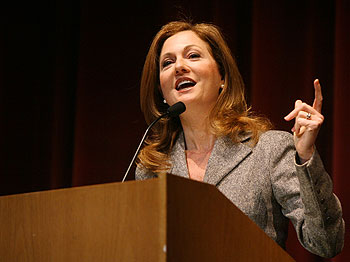Koppel details career as ‘accidental journalist’
By Rosemary Pennington

Andrea Koppel targeted the student journalists in the crowd as she shared her advice from 20 years as a broadcaster with a Bloomington audience Monday.
“Never say never,” she said. “And learn a foreign language and learn to speak it well. It will open up doors for you that would otherwise have been closed.”
Koppel kicked off the School of Journalism’s spring Speakers Series at the Buskirk-Chumley Theater Monday night with her talk, “The Accidental Journalist.” Speaking to a mixed audience of students and area residents, Koppel talked about her career as a broadcast journalist — a career she said she had never wanted.
“I didn’t want to be a journalist,” Koppel said. As the daughter of former Nightline anchor and broadcaster Ted Koppel, she said she didn’t want to live in her father’s shadow. “People just assumed that because of who my father was I’d be a journalist.”
Instead, Koppel told the audience, her Plan A was to join the Peace Corps and serve in Nepal. She thought that might be a good way to use her knowledge of political science and Mandarin Chinese. The trouble was, when that plan fell through, she had no Plan B.
“So I was back home living with my parents who were pushing me to get a job, figure out what I wanted to do with my life,” Koppel said. As luck would have it, a family friend told her of a woman wanting to hire American women to work in Beijing. Soon thereafter, she found herself on a plane to China. Her time there would change the course of her life.
“Most of my friends in China were journalists,” Koppel said. “While there I realized, yes, I do want to be a journalist.”

When she found herself stateside again, Koppel took a job at a small radio station in Columbia, S. C. From there, she worked her way through local TV news stations before landing a job with CNN in 1993, first reporting from Tokyo and eventually taking over the Beijing bureau.
“For three years, I reported from all over China,” she said, “and from more than half its 30 provinces and autonomous territories. Speaking the language gave me an incredible kind of insider’s view of China.”
But it did not save her from dealing with censorship issues. The Chinese government then, as now, tightly controlled the kinds of stories that were told about the nation. One story that aired late in her time at the Beijing bureau could have landed Koppel in a lot of hot water had Chinese authorities found the tapes. It was about how, at a time when the Chinese economy was growing in leaps and bounds, the faithful communist worker was left behind. The video showed a former factory worker covered in large bedsores, “literally rotting in his bed,” Koppel said.
Koppel and her crew hid the tapes in the ceiling of their hotel room. Soon after, they all were hauled into a Chinese police station and interrogated about the interview after local “snitches” turned them in. For hours, Koppel denied the tapes’ existence as she was questioned by a chain-smoking Chinese investigator.
“It was like a scene from that Academy Award-winning movie, The Lives of Others,” she said.
Koppel and her crew eventually were let go, but they held onto the story for months, debating whether to air it. It was an ethical issue for them.
“We did not want to get this family in trouble,” Koppel said. “But we felt we had an obligation to report on the nature of this tragedy. We can decide whether it’s a story to us, but this was the first time I’d really seen the consequences of our reporting. Our actions can adversely affect the lives of the people we report on.”

To affect those lives as little as possible, Koppel’s team decided to change the names of the people they interviewed as well as their location in China. They hoped this strategy, coupled with the five or six months it took to get the piece on the air, would be enough to protect the people in their story. They never knew for sure whether those interviewees were harassed for talking with CNN. Koppel said they just couldn’t risk finding out.
“I was really surprised to hear her talk so much about China,” freshman Dana Staton said when asked what she thought of Koppel’s talk. “But it was really interesting. I really enjoyed the question and answer session that came afterward.”
“I was glad she talked about the importance of learning a foreign language,” said Haley Adams, also a freshman. “I totally agree with her and I think it’s something we don’t talk enough about.”
Something Koppel spent virtually no time talking about was her latest career move. After 14 years with CNN, Koppel left the network in July. Late last week, news came that she’ll now be heading up the communications division of M + R Strategic Services, a public relations firm that spends the majority of its time working with nonprofit organizations.
Earlier Monday, during a luncheon with a group of journalism students, a student asked Koppel how the new job has changed her news perspective.
“I don’t think it’s changed it at all,” Koppel said. “It’s changed how I work with the media; now I’ll be trying to get my clients in the news. But, at the end of the day, I don’t think I want anything different as a news viewer as I did as a journalist. I want news that informs me, that tells me something about the world.”
The School of Journalism spring Speaker Series continues with commentator William Safire March 24 and presidential historian Michael Beschloss April 14.

